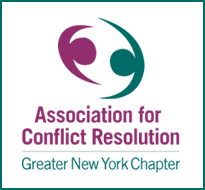|
.png)
.png)
VIEW BIOS OF WEDNESDAY SPEAKERS TODAY'S SESSIONS ARE SPONSORED BY 9:00am 0.5 CLE CREDIT In this workshop/presentation/program, Prof. Bush will explore the philosophical bases for regarding party self-determination as fundamental to the mediation process – as commonly stated in mediator ethics codes. The meaning and significance of agency in human life will be discussed. Then, examples of how mediator respect for party self-determination affects human agency, for good and for ill, will be offered from actual practice and from the mediation literature. Participants are invited to engage in active discussion of the topic. 9:55am 1 CLE CREDIT Insurance Touches Everything. This seminar will explore various types of insurance-related matters and best practices for negotiating and facilitating those cases at mediation. Join the ACR-GNY community for a walk through the mind of a former commercial complex claims veteran turned mediator/arbitrator, as she leads a panel discussion around how to guide the process and influence equitable resolution. The panel will explain tips and strategies for navigating these cases from the pre-mediation stage to conclusion. Though every case is different, many of the considerations for the mediation process are consistent. This interactive conversation is sure to provoke audience curiosity and questions that are often asked, but seldom answered. 10:55am The field of conflict resolution is growing and will continue to grow in the future, as the need for peaceful, respectful, cost-effective, and time efficient problem-solving interventions is mounting. This demand is met by people who are drawn to the ADR industry for various motives and offer dispute resolution services to the public. It is crucial that ADR providers, both bodies and individuals, are accountable, trustworthy, and instill public confidence in the ADR professions and processes. The proposed session will focus on our vision for a robust ethical practice within the field of mediation. We will draw on our academic and practical experience, as well as our involvement in national and international endeavors to develop ethical standards and accountability mechanisms for mediators. The participants will learn about the conditions required for supporting ethical mediation practice and will be invited to share their views on the best ways to promote that goal, which we see as essential for the healthy growth of mediation. 11:55am Culture change has been mentioned in workforce literature for many years. However, implementing that change has been elusive. Dignity in the workplace may be the missing element in the quest for culture reform. Recent literature posits that attention to dignity and psychological safety at work can improve organizational culture and morale. Organizational culture is negatively affected by toxic interactions. These can easily lead to harmful conflict. Conflicts in the workplace are innumerable and costly. According to surveys, 85% of employees experience conflict at some time, and 29% nearly constantly experience conflict. To date, little attention has been focused on identifying and reforming components of organizational culture that contribute to conflict. We will trace the path from acknowledging inherent dignity in the workplace to sustainable conflict resolution. Workplace conflict can arise from indignities. These actions range from microaggression to the threat of violence and beyond to actual violence. We will look at the strategies workers use to confront, alleviate, and cope with these attacks on their dignity, the role dignity plays in conflict, and the absence of a framework to deal with workplace indignities. We will discuss how conflict resolution skills can restore inherent dignity. 12:35pm The U.S. Equal Employment Opportunity Commission (EEOC) is responsible for enforcing federal laws that make it illegal to discriminate against a job applicant or an employee because of the person's race, color, religion, sex (including pregnancy, transgender status, and sexual orientation), national origin, age (40 or older), disability or genetic information. The U.S. EEOC’s Mediation Program offers parties to a charge the opportunity for a fair and efficient means to resolve their employment disputes. Mediation at the EEOC is cost-free to the parties, and participation in mediation at the Agency is always voluntary. Since the EEOC’s Mediation Program was fully implemented nationwide in 1999, Agency mediators have seen their fair share of trends as the field has evolved over the years. Hear from EEOC Mediators as they discuss mediation related topics such as the use of joint sessions and party opening statements, or lack thereof, virtual mediations, and other evolving strategies for successful negotiations in mediating employment discrimination disputes. Mediators will also discuss what they believe the future holds for the mediation process. 1:30pm Neighborhood Dispute Settlement (NDS) provides an Eviction Diversion Mediation Clinic (EDMC) for landlords and tenants. This workshop would provide helpful strategies and solutions for the sometimes-challenging dynamics of the landlord/tenant and neighbor-to-neighbor relationships between individuals living in a shared rental community as it relates to the prevention of eviction and homelessness. There are some landlords and tenants who are not aware of the benefits of mediation. In addition, there are also some tenants who are unfamiliar with the various life skills needed to successfully live in a shared residential community with other individuals. Consequently, eviction-related issues can arise resulting from neighbor and other lease-violation incidents. In addition to unpaid rent, other lease violations such as noise, harassment, parking, smoking, young children, pets, and other matters may also become problematic for tenants. When the matters concern public housing, individuals' housing-related vouchers may be in jeopardy, resulting in an eviction. Fortunately, from the benefits of mediation to tenant-educational trainings, workshop attendees will leave with their minds full of helpful strategies to assist landlords, tenant, and neighbors to resolve their differences and prevent evictions. 2:30pm The Tanenbaum Center for Interreligious Understanding has been identifying, highlighting, and rewarding grassroots, faith motivated activists since 1998 through its Peacemakers in Action Award. In 2010, the awardees unanimously decided to take their engagement one step further and form the Peacemakers in Action Network under the Tanenbaum umbrella. Tanenbaum shares the personal stories and peacebuilding techniques of these inspiring individuals through individual case studies. In this session, Tanenbaum's Peacebuilding program will present the network and case study models it has been working with for more than a decade. The Peacemakers in Action Network convenes 29 living peace activists across 23 conflict zones, with a collective impact that has reached hundreds of thousands of refugees, IDPs, women, and children affected by conflict. Through its case study model, Tanenbaum has published two volumes of Peacemakers in Action case studies and launched its first season of the Peacemakers in Action podcast. 3:25pm The now ubiquitous eighty-page commercial lease has a myriad of tenant and landlord rights and obligations which can potentially create conflict. For example, how to calculate operating expenses, rent escalations or adequacy of building services and the like. Major landlords and tenants see the disadvantages of litigating these disputes and so a mechanism for streamlined resolution would be welcome. Enter, stage right, mediation. 4:05pm The intersection between artificial intelligence (AI) and international arbitration represents a transformative leap in the field of dispute resolution. AI technologies are increasingly being integrated into various aspects of arbitration to enhance efficiency, streamline processes, and ensure fair and consistent outcomes. One notable application is the use of AI in document review and e-discovery. Machine learning algorithms can quickly analyze vast amounts of legal documents, helping legal teams identify relevant information and patterns, thereby reducing the time and cost associated with document review. Additionally, AI-powered tools can assist in predicting case outcomes based on historical data, aiding arbitrators in making more informed decisions. Moreover, AI is being employed in the selection of arbitrators. Algorithms can analyze the expertise, experience, and track records of potential arbitrators, providing parties with data-driven insights to make informed choices. This contributes to the transparency and fairness of the arbitration process. Despite the potential benefits, challenges such as data privacy, ethical considerations, and the need for human oversight persist. Striking the right balance between leveraging AI technologies and preserving fundamental principles of justice is crucial in navigating the evolving landscape of AI in international arbitration. As technology continues to advance, stakeholders must actively engage in discussions and establish guidelines to ensure that AI enhances, rather than undermines, the integrity of the arbitration process. 6:00pm Separate Registration Required In a world marked by increasing religious prejudice and violence, the work of the Tanenbaum Center for Interreligious Understanding stands as a beacon of hope and progress. Join us as we celebrate and honor Tanenbaum's tireless efforts in combating religious-based prejudice and promoting peace through understanding. This panel discussion will highlight the essential role of Tanenbaum's work in the field of conflict resolution and transformation, showcasing its impact across education, healthcare, the workplace, and peacebuilding initiatives. PANELISTS: Rev. Mark E. Fowler Rabbi Melinda Zalba Daniel Del Nido, Ph.D. Élie Khoury Welcome remarks by Nick Pozek, ACR-GNY President-elect Tanenbaum introduction by Holly Weiss, Tanenbaum board member Panel moderated by Emily Skinner, Ph.D., ACR-GNY President LOCATION: American Arbitration Association - International Centre for Dispute Resolution (AAA-ICDR) ADDRESS: 150 E. 42nd Street, 17th Floor, New York, NY 10017 |








